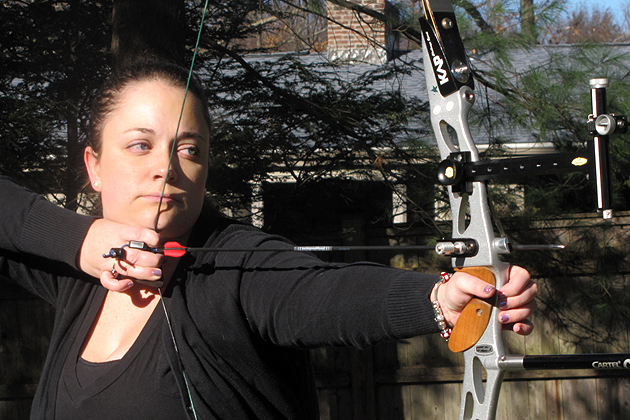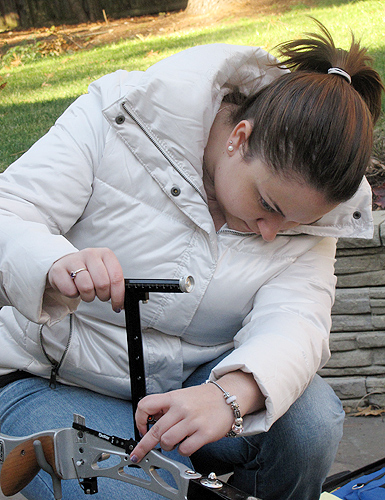
As an undergraduate at UConn, Elizabeth Didan ’11 (CLAS) spent many solitary hours researching salamanders, and in her spare time became an elite competitor in a sport that rewards intense single-mindedness. But much as she enjoyed these individual pursuits, they helped her realize that for her career, she wanted to work with people.
The 22-year-old graduate of the Honors Program is now pursuing a bachelor’s in nursing out of state, and planning to obtain a graduate degree.
“I really had a great college experience,” says the New England Scholar and CLAS Dean’s Award winner, an archer who represented UConn and the U.S. at the Collegiate World Games.
Didan went to China with America’s World Archery Team the summer before graduation, and posted her personal best score.
Originally introduced to bows and arrows at camp while in middle school, Didan’s archery career began as a lark during her first semester at UConn. Her boyfriend urged her to join him on UConn’s club-level Archery Team, which was then beginning its second year of competition.

Shooting recurve – meaning she uses a traditional-looking bow – Didan received the Best New Archer Award at a club sports national competition, and that motivated her to practice even more.
“After winning the award, I decided there’s a lot I love about archery, and I wanted to be good at it,” Didan says. “You’re part of a team but it’s more of an individual sport, requiring a lot of focus and mental power.”
At the same time, Didan, an ecology and evolutionary biology major, applied to UConn’s Honors Program. She says the program provided her with support and opportunities to conduct research – experience she needed as a science major.
“I went around to different professors asking to work with them,” Didan says. Mark Urban, an assistant professor in ecology and evolutionary biology, offered her a choice of projects to work on.
For 2½ years, Didan researched aggression in larval salamanders born in ponds – actually giant shallow puddles – that often dry up and disappear within six weeks of the amphibians’ birth. Supported by UConn’s Summer Undergraduate Research Fund, Didan says she investigated, “how some salamanders adapt, living long enough in such a crazy competitive environment to metamorphose into land creatures. I spent a lot of days out in the field doing research, or in an office doing statistics by myself; it can get lonely.”
Didan began her last year at UConn, thinking about her future. “That’s what seniors do,” she says. “My research experience was absolutely invaluable, because I realized that research can get slow, and I’m not sure I’m patient enough for that kind of life. I fell upon nursing because there are people 24/7. Nursing offers so much to do, and is more appropriate for my personality.”
Didan attributes her self-knowledge to her success in the field. “In archery you really have to be conscious of yourself. I like that archery requires you to ignore things happening around you, which is odd for sports, because usually you have to be aware of what others are doing. Some archers tend to focus on comparing their scores to others, but I think it’s better to focus on your own goals. Doing my personal best is more important than winning.”



